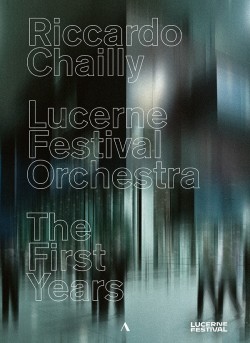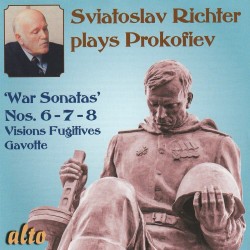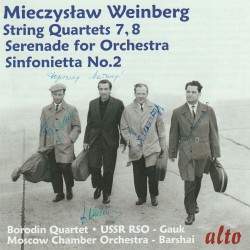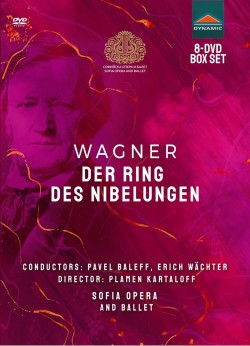 Riccardo Chailly and the Lucerne Festival Orchestra – The First Years (Accentus Music ACC70570 naxos.com/CatalogueDetail/?id=ACC-70570). This elegant 4DVD- boxed set is titled such that one can only hope there will be more to come. The Lucerne Festival Orchestra began in 1938 under the baton of Toscanini and existed for 65 years. The musicians were culled from the Mahler Chamber Orchestra, some members from the Berlin Philharmonic as well as from other leading ensembles. It went dormant for ten years but was resurrected in 2003 especially for Claudio Abbado. After his passing, Riccardo Chailly became the music director in 2016 and has recently had his contract extended through 2026, so this set of “early years” refers to a recording each year between 2016 and 2019.
Riccardo Chailly and the Lucerne Festival Orchestra – The First Years (Accentus Music ACC70570 naxos.com/CatalogueDetail/?id=ACC-70570). This elegant 4DVD- boxed set is titled such that one can only hope there will be more to come. The Lucerne Festival Orchestra began in 1938 under the baton of Toscanini and existed for 65 years. The musicians were culled from the Mahler Chamber Orchestra, some members from the Berlin Philharmonic as well as from other leading ensembles. It went dormant for ten years but was resurrected in 2003 especially for Claudio Abbado. After his passing, Riccardo Chailly became the music director in 2016 and has recently had his contract extended through 2026, so this set of “early years” refers to a recording each year between 2016 and 2019.
The 2016 recording is of the powerful Mahler Eighth Symphony, with which Chailly completes the cycle left unfinished by Abbado. This performance of enormous energy heralds the newly appointed conductor. Chailly was well familiar with Mahler having previously released Mahler: The Symphonies in 2005 with the Royal Concertgebouw Orchestra and the Radio Symphonie Orchestra Berlin, among other highly acclaimed recordings.
The second disc in this box contains Mendelssohn’s ever-fresh music from A Midsummer Night’s Dream and a performance of Tchaikovsky’s Manfred Symphony. The Manfred is more thrilling than ever and suffice it to say that Chailly’s direction highlights the high qualify of the orchestra in excerpts from the Mendelssohn.
Disc three is the collection of performances of four of Ravel’s most popular works, Valses nobles et sentimentales, La Valse, Daphnis et Chloé (Suites Nos.1 and 2) and Bolero. Who could resist these, especially in these Romantic performances from 2018?
Finally, this eclectic collection is rounded out with an all-Rachmaninoff disc recorded in 2019. These will be the versions to be remembered with dazzling performances by pianist Denis Matsuev. The program opens very gently with the deceptively difficult Third Piano Concerto. This piece begins with a very simple melody and builds to a vigorous and grand Rachmaninoff style tutti. The encores were equally impressive, Etude Tableau in A Minor Op.39/2 and the orchestral version of Vocalise Op.34/14. This live concert was rounded out with Rachmaninoff’s Symphony No.3 in A Minor Op.44, regarded as his more Russian symphony with its beautiful dance rhythms and lush orchestration.
 Sviatoslav Richter plays Prokofiev – “War Sonatas” Nos. 6-7-8; Visions Fugitives; Gavotte from Cinderella (Alto ALC 1459 altocd.com) Richter surely recorded these works many, many times and undoubtedly all the transfers vary greatly in quality, but I can tell you that these performances are stunningly impressive. The recordings date from between 1956 and 1962 and you can feel the energy in each and every one of them. In fact, they are all startlingly real and fresh. As many readers might know, these sonatas can be aggressive and disturbing, certainly to be expected from “War Sonatas,” but there is also very beautiful melodic, lyrical music here and Richter understands and captures all of it.
Sviatoslav Richter plays Prokofiev – “War Sonatas” Nos. 6-7-8; Visions Fugitives; Gavotte from Cinderella (Alto ALC 1459 altocd.com) Richter surely recorded these works many, many times and undoubtedly all the transfers vary greatly in quality, but I can tell you that these performances are stunningly impressive. The recordings date from between 1956 and 1962 and you can feel the energy in each and every one of them. In fact, they are all startlingly real and fresh. As many readers might know, these sonatas can be aggressive and disturbing, certainly to be expected from “War Sonatas,” but there is also very beautiful melodic, lyrical music here and Richter understands and captures all of it.
His relationship with Prokofiev is well documented and they had a deep and abiding friendship. In 1943 Richter performed the world premiere of the Piano Sonata No.7, and for Prokofiev’s 55th birthday, he performed all three of these sonatas for the first time in concert. To thank him for his dedication, Prokofiev inscribed Piano Sonata No.9 to Richter and it may be said that no one played these pieces with such great understanding.
It is unfortunate that Richter did not record these sonatas in ideal studio conditions, but to the best of my knowledge he did not. There are so many recordings out there but to my ears, these are outstanding. So, without a doubt this CD should be added to your collection, no matter how many versions you may already own.
 Mieczyslaw Weinberg – String Quarters 7 and 8; Serenade for Orchestra; Sinfonietta No.2 (Alto ALC1458 altocd.com) Polish born Soviet composer and pianist Mieczysław Weinberg has been a favourite of mine for many years although I admit that I don’t know all his works. I was pleased to receive a new reissue, including several pieces with which I was previously unfamiliar.
Mieczyslaw Weinberg – String Quarters 7 and 8; Serenade for Orchestra; Sinfonietta No.2 (Alto ALC1458 altocd.com) Polish born Soviet composer and pianist Mieczysław Weinberg has been a favourite of mine for many years although I admit that I don’t know all his works. I was pleased to receive a new reissue, including several pieces with which I was previously unfamiliar.
The disc opens with Serenade for Orchestra Op.47 No.4 played by the USSR State Radio Orchestra under Alexander Gauk. This is a very happy and optimistic piece in four short movements and provides a great introduction to Weinberg for those not familiar with him. The two string quartets, No.7 in C Major recorded in 1957 and No.8 in C Minor recorded in 1959 are played by the Borodin String Quartet. These works are intense and reflect the tensions of the then “current times.” It is no surprise that Weinberg’s music was strongly influenced by one of his closest friends, Shostakovich, and that this fine ensemble who worked so closely with that master should take on the music of Weinberg too.
Almost as a bonus, Sinfonietta No.2, Op.74 played by the Moscow Chamber Orchestra under Rudolf Barshai (recorded in 1960) is friendly and lyrical. All the transfers of these precious performances are immaculate and alive. These early rare recordings are a most welcome addition to my collection.
 Der Ring Des Nibelungen, Sofia Opera and Ballet, Dynamic, Blu-Ray 57964 | DVD 37964 (naxos.com/CatalogueDetail/?id=DYN-57964). Although technically not “old wine in new bottles” as this is the first issue of these performances from a decade ago, I’ve repeatedly enjoyed experiencing them so much over the past few months that I wanted to share them with you.
Der Ring Des Nibelungen, Sofia Opera and Ballet, Dynamic, Blu-Ray 57964 | DVD 37964 (naxos.com/CatalogueDetail/?id=DYN-57964). Although technically not “old wine in new bottles” as this is the first issue of these performances from a decade ago, I’ve repeatedly enjoyed experiencing them so much over the past few months that I wanted to share them with you.
Wagner’s Der Ring Des Nibelungen, directed by Plamen Kartaloff is featured in an 8-DVD set of performances that were recorded between 2010 and 2013, one opera each year. Finally released in 2023, to the best of my knowledge this represents the first complete Ring Cycle from the Balkans. There was clearly no lack of talent as these performances attest. The cycle obeys Wagner’s music direction and libretto but uses technology unavailable to him, technologies that I believe he would have fully embraced and utilized given the chance. Pavel Baleff conducts the first three operas and Eric Wachter conducts Götterdämmerung. Although I am unfamiliar with either of them, this is world-class conducting.
Costuming, projections and powerful sets come together to create an extraordinary illusion. The fundamental circular ring motif is used to great affect and with the aid of projection and lighting they represent the magic ring of fire, the beautiful Rhine as well as the dragon’s lair. The other dominant staging component, the cones, are used to represent everything from horses to the spires of Valhalla and I thought the Ride of the Valkyries was among the most noteworthy. Lighting projections by Rumen Kovachev and Kartaloff were matched to the music and onstage drama.
At first I thought that the staging and costuming was a distraction and was quick to notice aspects that I didn’t like. However, once I gave myself permission to listen and watch, I discovered that, in fact, the staging truly serves the music and the story. It was strange not seeing the sets I was familiar with, but I came to realize that this staging told the story just as well and perhaps highlighted some facets of the libretto even more clearly or persuasively than I had experienced before. I have been immersed in these DVDs for weeks now and realize there is so much to be appreciated in every scene. Ultimately the costuming was a bit preposterous, it was the debut of Nikolay Panayotov as his first foray into costume design for opera. I imagine that some of them worked better on stage than the camera closeups afforded. Costumes were bright and colourful and at once futuristic, space-aged and retro.
The majority of the singers save three Brünnhildes are Bulgarian and those three Mongolian Brünnhildes studied at the Conservatoire in Sofia. There was so much to admire in many of the voices. The Brünnhilde in Götterdämmerung, sung by Iordanka Derilova was particularly noteworthy as was the Loge in Das Rheingold, Daniel Ostretsov. Yes, there were many more excellent voices. The acting was very convincing and the camera work did not disappoint.



